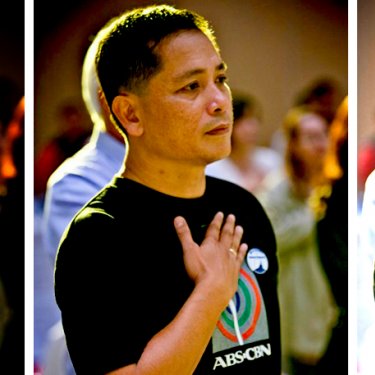Investigation : Despite long legal battle, alleged mastermind behind murder of courageous Filipino journalist still at large

Substantial flaws were found in the legal procedures in the case of murdered Filipino journalist Gerry Ortega, A Safer World For The Truth project finds in its latest investigation. The report also finds that the alleged mastermind of Ortega’s murder still exerts considerable influence over local authorities in Palawan, where the murder happened, and that key witnesses in the case have been endangered or silenced.
The murder of Gerry Ortega: Justice Delayed; Justice Denied is the fourth in a series of investigations as part of the A Safer World For The Truth initiative, a project by leading press freedom organizations Free Press Unlimited (FPU), Reporters Without Borders (RSF), and the Committee to Protect Journalists (CPJ) that investigates murders through a series of cold case investigations, ongoing advocacy efforts, and the People’s Tribunal on the Murder of Journalists.
Gerry Ortega was found dead on 24 January, 2011, in Palawan, a province located in the West or the Philippine archipelago. His murder indicative of structural problems concerning the safety of journalists in the Philippines: while the hitmen are often arrested, the powerful masterminds behind the killings of journalists often evade justice.
Attacks on the media have escalated under President Rodrigo Duterte, but the Philippines has long been a dangerous country for journalists. The National Union of Journalists of the Philippines (NUJP) noted that Ortega was the 142nd journalist to be killed since 1986. The country has also consistently ranked high on CPJ’s Impunity Index, coming in as the seventh worst country in 2021.
Flaws
Gerry Ortega was a prominent broadcast journalist, with a special focus on environmental issues in the province of Palawan. Ortega’s work informing the public on graft and corruption within the provincial government made him a target for those in power. He was not afraid to openly criticize local politicians such as then-governor Joel T. Reyes for alleged corruption, publicly opposing Palawan mining projects.
The report finds that alleged mastermind Reyes –who has considerable influence in the Palawan region– has escaped justice for more than a decade. More than 10 years after Ortega’s murder, multiple legal decisions have delayed the case, which has left Ortega’s family without justice or answers. The drawn-out legal battle has also exposed them and key witnesses to safety risks. The suspicious death of a key witness and recent attack on another, as detailed in the investigation, are important examples of how those involved in the case have been silenced as well.
One of the more concerning findings of the report are the flaws during the legal procedures, such as the rejection by the First Panel of Prosecutors of important independent and supporting evidence that Reyes masterminded the murder. The report further sheds light on how Reyes still exerts considerable influence over local public officials in Palawan, as he runs for office in upcoming elections this year.
Regular monitoring by the DoJ is needed
In light of these findings, A Safer World For The Truth recommends several concrete steps that must be taken in order to achieve justice for Ortega and to prevent impunity in future cases of journalist murders in the Philippines. These include urging the Philippine National Police to prioritize holding Reyes accountable by ensuring that the Criminal Investigation Division Group that forms part of the National Police acts on his arrest warrant. The report also urges the Philippine Department of Justice (DoJ) to regularly monitor and evaluate cases of journalist murders to ensure a speedy investigation and effective response to any gaps in the prosecution of these cases
The report also puts forth that the international community has a role to play in ending impunity for Ortega’s murder by creating sustained public pressure and monitoring the progress of the prosecution of Reyes. When requested by Philippine authorities or Ortega’s family, resources and expertise should be made available by the international community to spur the investigation and prosecution.
Jos Bartman, lead researcher of the investigation at FPU (FPU), states: “It has been 10 years since the murder of Gerry Ortega. This case represents a much broader problem of powerful local actors being able to escape justice after a journalist is murdered. After 10 years, the delay of justice becomes the denial of justice. With this investigation we aim to contribute to justice for Gerry Ortega and his family. The lessons learned should provide opportunities to let justice prevail immediately in future cases of journalist murders.”
Shawn Crispin, CPJ senior Southeast Asia representative, states: “Gerry Ortega’s unsolved murder is emblematic of the Philippines’ wholly unresolved impunity problem in media murder cases. Until full justice is served for Ortega’s killing, a climate of fear will endure for all Filipino journalists who report on important issues like local corruption and official abuse of power. How many more Gerry Ortegas must there be before Philippine authorities take the nation’s impunity problem seriously?”
Daniel Bastard, Asia-Pacific director at RSF, states: “Since the beginning of Duterte’s term, the Philippines has dropped 11 places and currently finds itself on 136th place on the RSF 2021 World Press Freedom Ranking. Change needs to happen. We support the call for the establishment of a new Special Representative of the UN Secretary General for the Safety of Journalists. For the important case of Gerry Ortega, a UN Special Representative could stay in regular contact with the Department of Justice of the Republic of the Philippines to encourage them to take up the case.”
Previous investigations and recommendations can be found at https://www.saferworldforthetruth.com/investigations
Press contacts:
CPJ (New York): Gypsy Guillén Kaiser - [email protected]
FPU (Amsterdam): Evelien Wijkstra - [email protected]
RSF (Paris): Pauline Adès-Mével - [email protected]
Spokespeople are available for interviews in English, French, Spanish and Dutch



